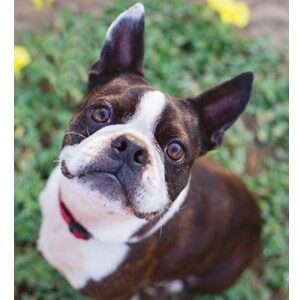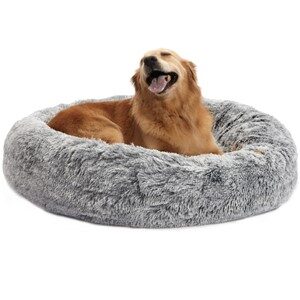Best Dog Bed for Boston Terriers
Orthopedic Beds are Best for Boston Terriers!
Introduction
Best dog bed for Boston Terriers will take into account their medical issues, sleeping style, and preferences. An orthopedic dog bed is the best choice. If your dog suffers from aching joints, muscles, or has arthritis, this type of bed will bring them the most comfort.
The Boston Terrier, affectionately known as the “American Gentleman,” is a small, charming breed with a distinctive tuxedo-like coat and a lively personality. Originating in the United States in the late 19th century, Boston Terriers were initially bred as fighting dogs but quickly evolved into loving, family-oriented companions.
With their expressive eyes, compact build, and alert ears, they are instantly recognizable and beloved by dog enthusiasts. Boston Terriers are known for their friendly, affectionate nature, making them excellent companions for families, singles, and seniors alike.
They are intelligent and eager to please, which makes training relatively easy, although they can exhibit a stubborn streak at times. Despite their small size, they are full of energy and enjoy regular playtime and moderate exercise.
As a brachycephalic breed, Boston Terriers have a short, flat nose, which can make them prone to breathing difficulties, especially in hot or humid weather. They thrive in a home where they are part of the family’s daily activities and can be prone to separation anxiety if left alone for long periods.
With proper care, including regular vet check-ups and a balanced diet, Boston Terriers can live long, healthy lives, bringing joy and laughter to their owners.
In this guide we will share information about the Boston Terrier breed which will include facts about them, best dog beds, common health issues, behavioral concerns, costs of ownership, and safe foods and foods to avoid feeding them.
Best Types of Beds for Boston Terriers
Choosing the right bed for a Boston Terrier involves considering the breed’s specific needs, including their size, comfort preferences, and any health considerations like joint support. Here’s a guide to the best types of beds for Boston Terriers and some recommended brands:
- Orthopedic Beds:
- Why: Boston Terriers, like many breeds, can benefit from extra support for their joints, especially as they age. Orthopedic beds are made with memory foam or other supportive materials that help relieve pressure on joints and provide extra comfort.
- Ideal For: Older dogs, dogs with arthritis, or those who enjoy a firmer sleeping surface.
-
Donut or Bolster Beds:
- Why: These beds have raised edges or bolsters around the sides, providing a sense of security and a place for the dog to rest its head. Boston Terriers often enjoy curling up, and the bolster design supports this sleeping style.
- Ideal For: Dogs that like to curl up or lean against something while they sleep.
- Cooling Beds:
- Why: Boston Terriers are brachycephalic, meaning they can be prone to overheating. A cooling bed or one with breathable, moisture-wicking fabric can help regulate their body temperature, especially in warmer climates.
- Ideal For: Dogs living in warm environments or those prone to overheating.
- Cave or Hooded Beds:
- Why: Some Boston Terriers enjoy burrowing or having a cozy, enclosed space. A cave bed or a hooded bed provides a sense of security and warmth.
- Ideal For: Dogs that like to burrow or need extra warmth.
- Washable Beds:
- Why: Given the short coat of Boston Terriers, maintaining cleanliness is relatively easy, but having a bed that is fully washable makes it simpler to keep their sleeping area hygienic.
- Ideal For: Owners who want a low-maintenance bed that’s easy to clean.
Recommended Brands for Boston Terrier Beds
- Casper Dog Bed:
- Features: Designed by the makers of the popular human mattress, the Casper Dog Bed features memory foam for orthopedic support, durable materials, and a removable, machine-washable cover.
- Best For: Boston Terriers that need extra joint support and durability.
- Best Friends by Sheri OrthoComfort Deep Dish Cuddler:
- Features: This bed offers a high back wall for support, making it a great choice for dogs that like to curl up. It’s also made with cozy, soft materials for added comfort.
- Best For: Boston Terriers that enjoy cuddling and burrowing.
- PetFusion Ultimate Dog Bed:
- Features: Made with solid memory foam and bolsters for added head support, this bed is durable, comfortable, and has a water-resistant cover. It’s also available in different sizes to match your dog’s needs.
- Best For: Dogs needing orthopedic support with added comfort from the bolsters.
- K&H Pet Products Cooling Bed III:
- Features: This cooling bed is filled with water to help regulate your dog’s body temperature. It’s particularly useful for Boston Terriers in warmer climates.
- Best For: Boston Terriers that tend to overheat or live in warm areas.
- FurHaven Orthopedic Sofa-Style Dog Bed:
- Features: This bed combines orthopedic foam with a soft, faux fur lining and bolstered edges. It’s available in various sizes and colors, and the cover is removable and washable.
- Best For: Boston Terriers that enjoy a mix of softness and support with the added security of bolster edges.
- Snoozer Cozy Cave Pet Bed:
- Features: This is a cave-style bed with a hood, perfect for dogs that like to burrow. It’s made with soft materials and a durable cover, offering both comfort and warmth.
- Best For: Boston Terriers that like to burrow or sleep in enclosed spaces.
Considerations When Choosing a Bed
- Size: Ensure the bed is appropriately sized for your Boston Terrier, allowing them enough room to stretch out comfortably.
- Material: Choose a bed made from durable, high-quality materials that are easy to clean and maintain.
- Support: If your Boston Terrier is older or has joint issues, opt for a bed with good orthopedic support.
- Climate: Consider the climate where you live. Cooling beds are ideal for warmer areas, while cave beds can provide extra warmth in cooler climates.
- CertiPUR-US Seal: When shopping for orthopedic dog beds be sure to look for the CertiPUR-US seal. The seal means that the materials used do not contain any chemicals or toxins that are harmful to humans and pets.
- Placing the Bed: When placing the dog bed in your home, be sure it is out of the way of heavy traffic and drafty areas.
These recommendations should help potential Boston Terrier owners find the perfect bed to keep their pup comfortable and well-rested.
Video: Pros and Cons about The Boston Terrier
If you are going to be a new owner of the Boston Terrier, then this video is for you. In the video you will learn the pros and cons of owning this dog breed. Video: Boston Terrier Pros and Cons
Facts about Boston Terriers
Below are some facts about Boston Terriers that potential new owners should be aware of.
Measurements
- Height Males: 15 – 17 inches
- Height Females: 14 – 16 inches
- Body Length Males: 19 – 21 inches
- Body Length Females: 18 – 20 inches
- Body Weight Males: 12 – 25 lbs.
- Body Weight Females: 10 – 20 lbs.
- Lifespan Both: 11 – 15 years
- Fully Grown: Between 12 – 18 months
- Colors: Black & White, Brindle & White, Seal & White, Black with White Markings, Chocolate, Blue, Red
- Popularity: This dog breed is the 21st most popular in the United States according to the American Kennel Club.
Facts
- Origin: United States (Boston, Massachusetts)
- Coat: Short, smooth; typically black, brindle, or seal with white markings
- Lifespan: 11 to 15 years
- Nickname: “American Gentleman” due to their tuxedo-like coat and polite demeanor
- Exercise Needs: Moderate; enjoys daily walks and playtime
- Grooming: Low-maintenance; requires regular brushing and occasional baths
- Common Health Issues: Brachycephalic Syndrome, eye problems, deafness, and allergies
- AKC Recognition: Officially recognized by the American Kennel Club in 1893
- Ideal for: Families, singles, and apartment living due to their adaptable nature
- Training: Relatively easy to train but can be stubborn at times
- Notable Trait: Their prominent, large eyes and square-shaped head with a short muzzle
- Adaptability: Well-suited for both urban and rural environments
- Temperament: Boston Terriers personality is known for their friendly, lively, and intelligent nature. They are often called “American Gentlemen” because of their polite demeanor.
- Training: They are intelligent and eager to please, making them relatively easy to train. However, they can sometimes be stubborn, so consistent and positive reinforcement methods work best for this breed.
- Affectionate: They are highly affectionate and tend to form strong bonds with their families. They are also good with children and can get along well with other pets.
- Adaptable: Boston terriers are adaptable dogs that can thrive in both city and country environments. They are well-suited for apartment living due to their small size and moderate exercise needs.
- Weather: Boston Terriers do not like the cold or hot weather. If you live in extreme weather conditions, they may struggle in regulating their body temperature.
- Risk of Obesity: Boston Terriers have a tendency of gaining weight which can lead to various health issues which is what you want to avoid. You must monitor their diet and control of the treats used in training sessions. Treats should not exceed more than 10% of their daily calories.
Fun Facts About Boston Terriers
- Boston’s Official Dog: The Boston Terrier is the official state dog of Massachusetts, where the breed was originally developed.
- First American Dog Breed: The Boston Terrier is one of the first dog breeds created in the United States and is often referred to as “America’s dog.”
- Born Comedians: Boston Terriers are known for their playful and sometimes clownish behavior, often entertaining their owners with their antics.
- Nicknamed “Tuxedo Dogs”: Their distinctive black and white coat pattern resembles a tuxedo, earning them the nickname “Tuxedo Dogs.”
- Presidential Pals: Several U.S. presidents, including Gerald Ford and Warren G. Harding, owned Boston Terriers. Harding’s Boston Terrier, named “Hub,” was known for attending cabinet meetings!
- Snoring Champions: Due to their short muzzles, Boston Terriers are notorious for snoring. It’s a charming quirk that many owners find endearing.
- Hollywood Stars: Boston Terriers have made appearances in various movies and TV shows. Their charming appearance and lively personality make them a popular choice in entertainment.
- Loyal Companions: Boston Terriers are known for their strong loyalty to their owners. They often follow their people from room to room, always wanting to be close by.
- War Heroes: During World War I, a Boston Terrier named “Sergeant Stubby” became the most decorated war dog and the only dog to be promoted to sergeant through combat. Stubby was a mascot for the 102nd Infantry Regiment and helped boost troop morale.
- Easy Sleepers: Boston Terriers love to nap and can often be found curled up in a cozy spot. Despite their lively nature, they know how to relax when it’s time to rest.
These fun facts highlight the unique and lovable characteristics that make Boston Terriers such a popular breed!
Common Health Issues with Boston Terriers
As a potential owner of a Boston Terrier, below are some health issues you need to watch out for.
- Brachycephalic Syndrome:
- Description: Boston Terriers have a brachycephalic (short-nosed) skull shape, which can lead to breathing difficulties, particularly in hot or humid weather.
- Symptoms: Snoring, noisy breathing, difficulty breathing, especially during exercise or in warm weather.
- Management: Keeping the dog cool, avoiding excessive exercise in hot weather, and sometimes surgery may be required to alleviate severe symptoms.
- Eye Problems:
- Cataracts: A common issue that can affect Boston Terriers, sometimes leading to vision loss.
- Corneal Ulcers: Due to their prominent eyes, Boston Terriers are more prone to corneal ulcers, which can be caused by trauma or irritation.
- Cherry Eye: A condition where the gland in the dog’s third eyelid becomes swollen and visible, often requiring surgical correction.
- Deafness:
- Description: Some Boston Terriers may be born deaf in one or both ears, a condition that can be hereditary.
- Testing: BAER (Brainstem Auditory Evoked Response) testing can determine the extent of hearing loss.
- Allergies:
- Skin Allergies: Boston Terriers are prone to skin allergies, which can lead to itching, redness, and hot spots. These allergies can be triggered by food, environmental factors, or contact with certain substances.
- Management: Identifying and avoiding allergens, regular bathing with hypoallergenic shampoos, and sometimes medication may be necessary.
- Patellar Luxation:
- Description: This is a condition where the kneecap dislocates or moves out of its normal position. It can be a congenital issue or develop over time.
- Symptoms: Limping, skipping, or an abnormal gait.
- Treatment: Mild cases may be managed with rest and anti-inflammatory medications, while severe cases may require surgery.
- Heart Murmurs:
- Description: Some Boston Terriers may be born with or develop heart murmurs, which are abnormal heart sounds caused by turbulent blood flow.
- Detection: Regular vet check-ups can help detect this condition, which may require monitoring or treatment depending on severity.
- Hemivertebrae:
- Description: This is a congenital condition where the vertebrae are abnormally shaped, potentially leading to spinal deformities.
- Symptoms: Can range from no symptoms to severe pain, weakness, or even paralysis in severe cases.
- Management: Treatment options vary based on the severity, from pain management to surgery.
- Cushing’s Disease:
- Description: A condition caused by excessive production of cortisol by the adrenal glands.
- Symptoms: Increased thirst and urination, weight gain, thinning skin, and hair loss.
- Diagnosis and Treatment: Requires blood tests and imaging, with treatment options including medication and surgery.
Regular vet check-ups, a healthy diet, and proper care can help manage and mitigate many of these health issues in Boston Terriers.
Behavioral Issues with Boston Terriers
Boston Terriers are generally well-behaved, intelligent, and affectionate dogs, but like any breed, they can develop certain behavioral issues. Here are some of the most common behavioral problems that may arise in Boston Terriers and how to address them:
- Separation Anxiety:
- Description: Boston Terriers are very attached to their owners and can become anxious or stressed when left alone for extended periods. This anxiety can lead to destructive behaviors such as chewing, digging, or barking.
- Solutions: Gradually accustom your Boston Terrier to being alone by starting with short absences and gradually increasing the time. Provide plenty of mental stimulation through toys and puzzles, and consider crate training to create a safe space for your dog. In severe cases, consulting a professional trainer or veterinarian may be necessary.
- Excessive Barking:
- Description: Boston Terriers can be prone to excessive barking, especially if they are bored, anxious, or trying to alert their owners to something. They are generally not known to be yappy dogs, but some may develop this habit.
- Solutions: Address the root cause of the barking by ensuring your dog gets enough physical and mental exercise. Teaching the “quiet” command and rewarding your dog for calm behavior can also be effective. Avoid reinforcing barking by not giving attention when your dog barks unnecessarily.
- Stubbornness:
- Description: Boston Terriers are intelligent but can sometimes be stubborn, particularly during training sessions. This stubbornness can manifest as ignoring commands or being slow to respond.
- Solutions: Use positive reinforcement techniques, such as treats and praise, to motivate your Boston Terrier. Keep training sessions short and fun, and be patient and consistent. Early socialization and training can help mitigate stubborn behavior.
- Aggression Toward Other Dogs:
- Description: Some Boston Terriers may display aggression toward other dogs, especially if they are not properly socialized or if they feel threatened. This behavior can include growling, snapping, or lunging.
- Solutions: Early and ongoing socialization is key to preventing dog aggression. Expose your Boston Terrier to various dogs and environments in a controlled manner. If aggression is a concern, consider working with a professional dog trainer or behaviorist to address the issue.
- Resource Guarding:
- Description: Resource guarding occurs when a dog becomes protective of food, toys, or other valued items, leading to growling, snapping, or biting if someone tries to take the item away.
- Solutions: Teach your Boston Terrier to trade items by offering something of higher value (like a treat) in exchange for the guarded item. Avoid taking items away forcefully, and practice commands like “leave it” and “drop it” to encourage your dog to relinquish items willingly.
- Leash Reactivity:
- Description: Leash reactivity occurs when a dog becomes overly excited, anxious, or aggressive when on a leash, particularly when encountering other dogs or people.
- Solutions: Train your Boston Terrier to focus on you while on walks by using treats and praise. Gradually expose your dog to triggers at a distance, rewarding calm behavior. Avoid using harsh corrections, which can exacerbate reactivity. A professional trainer can also help address this issue.
- Hyperactivity:
- Description: Boston Terriers have a lively and energetic nature, and some may become hyperactive, especially if they do not receive enough exercise or mental stimulation. This can lead to behaviors like excessive jumping, running around the house, or difficulty settling down.
- Solutions: Provide regular physical exercise, such as walks, playtime, and interactive games, to burn off excess energy. Mental stimulation through puzzle toys, training, and activities like scent work can also help calm a hyperactive Boston Terrier.
- Chewing:
- Description: Like many dogs, Boston Terriers may chew on furniture, shoes, or other items, especially during teething or when they are bored.
- Solutions: Provide plenty of appropriate chew toys and redirect your dog to these when they start chewing on inappropriate items. Supervise your dog and remove temptations, and ensure they get enough exercise and mental stimulation to prevent boredom.
Preventing and Managing Behavioral Issues
- Early Socialization: Expose your Boston Terrier to different environments, people, and animals from a young age to build confidence and prevent fear-based behaviors.
- Consistent Training: Start training early and use positive reinforcement techniques. Be consistent in your commands and expectations.
- Exercise and Mental Stimulation: Ensure your Boston Terrier receives adequate physical exercise and mental challenges to keep them content and well-behaved.
- Routine and Structure: Establish a daily routine that includes regular feeding, exercise, playtime, and rest. A predictable schedule can help prevent anxiety and hyperactivity.
By addressing these potential behavioral issues early and providing proper care, you can ensure that your Boston Terrier grows into a well-behaved and happy companion.
Costs of Owning a Boston Terrier
Owning a Boston Terrier comes with various costs, ranging from initial expenses to ongoing care. Here’s a breakdown of the average costs associated with owning a Boston Terrier:
Initial Costs
- Purchase Price or Adoption Fee:
- Buying from a Breeder: $800 to $2,500 (depending on the breeder’s reputation, the dog’s pedigree, and location).
- Adoption Fee: $100 to $500 (from a rescue organization or shelter).
- Initial Veterinary Care:
- First Vet Visit: $75 to $150 (includes a general health check, vaccinations, and deworming).
- Spaying/Neutering: $200 to $500.
- Microchipping: $25 to $50.
- Supplies:
- Dog Bed: $30 to $100.
- Crate: $50 to $150.
- Collar, Leash, and ID Tags: $20 to $50.
- Food and Water Bowls: $10 to $30.
- Toys: $20 to $50.
- Grooming Supplies: $25 to $75.
Ongoing Costs
- Food:
- Quality Dog Food: $20 to $50 per month (depending on the brand and size of the dog).
- Regular Veterinary Care:
- Annual Check-ups: $150 to $300 per year (includes vaccinations, heartworm tests, and general health assessments).
- Flea, Tick, and Heartworm Prevention: $15 to $30 per month.
- Grooming:
- Professional Grooming: $30 to $60 per session (usually needed every 1 to 3 months).
- DIY Grooming Supplies: $10 to $20 per month (for shampoo, brushes, nail clippers, etc.).
- Training:
- Puppy Training Classes: $100 to $300 for a 6-8 week course.
- Ongoing Training: $25 to $100 per session (if needed).
- Pet Insurance:
- Monthly Premiums: $20 to $50 per month (depending on the coverage plan).
- Miscellaneous:
- Pet-Sitting or Boarding: $25 to $50 per day (when traveling).
- Licensing: $10 to $20 per year (varies by location).
- Replacement of Toys, Beds, etc.: $50 to $100 per year.
Potential Additional Costs
- Emergency Vet Care:
- Emergency Visits: $250 to $1,000 (for unexpected illnesses or injuries).
- Surgery or Specialized Care: $500 to $3,000 or more (depending on the condition).
- Behavioral Training:
- Specialized Training: $50 to $150 per session (if behavioral issues arise).
- Dental Care:
- Professional Dental Cleaning: $200 to $500 per year.
Estimated Total Annual Cost
- Basic Annual Costs: $1,000 to $2,500 (including food, routine vet care, grooming, and other necessities).
- First-Year Costs: $1,500 to $3,500 (including initial purchase/adoption, supplies, and veterinary care).
These estimates can vary depending on factors like your location, the specific needs of your Boston Terrier, and your personal choices for care and services. Planning for these costs ensures that you can provide a happy and healthy life for your Boston Terrier throughout their lifetime.
Safe Foods and Foods To Avoid
Feeding your Boston Terrier a balanced and safe diet is crucial for their overall health and well-being. Here’s a list of safe foods you can offer your Boston Terrier and foods you should avoid:
Safe Foods for Boston Terriers
- Lean Meats:
- Examples: Chicken, turkey, lean beef, lamb.
- Benefits: Excellent source of protein for muscle development and energy.
- Note: Ensure the meat is cooked, boneless, and unseasoned.
- Fish:
- Examples: Salmon, sardines, tuna.
- Benefits: Rich in omega-3 fatty acids, which support skin, coat, and joint health.
- Note: Cooked and boneless fish is safest; avoid giving raw fish due to parasites.
- Fruits:
- Examples: Apples (without seeds), blueberries, bananas, strawberries, watermelon.
- Benefits: Provide vitamins, fiber, and antioxidants.
- Note: Remove seeds and cores from fruits like apples and give in moderation.
- Vegetables:
- Examples: Carrots, green beans, peas, cucumbers, sweet potatoes, broccoli.
- Benefits: Rich in vitamins, minerals, and fiber; great for low-calorie snacks.
- Note: Serve cooked or raw in bite-sized pieces; avoid overcooking to retain nutrients.
- Plain Cooked Rice and Pasta:
- Benefits: Good source of carbohydrates, especially useful for dogs with digestive issues.
- Note: Serve plain without added butter, salt, or sauces.
- Plain Cooked Eggs:
- Benefits: High in protein and vitamins, good for coat and skin health.
- Note: Serve cooked (scrambled or boiled) without seasoning.
- Peanut Butter:
- Benefits: High in protein and healthy fats, great for treats and stuffing in toys.
- Note: Ensure it’s xylitol-free, as xylitol is toxic to dogs.
- Plain Yogurt:
- Benefits: Good source of calcium and probiotics, which support digestive health.
- Note: Choose plain, unsweetened yogurt without artificial sweeteners.
- Pumpkin:
- Benefits: Rich in fiber and good for digestive health; helps with diarrhea and constipation.
- Note: Use plain, canned pumpkin (not pumpkin pie filling).
- Oatmeal:
- Benefits: A good source of fiber, especially for dogs with wheat allergies.
- Note: Serve cooked and plain without added sugars or flavors.
Foods to Avoid for Boston Terriers
- Chocolate:
- Reason: Contains theobromine, which is toxic to dogs and can cause vomiting, diarrhea, rapid heart rate, and seizures.
- Grapes and Raisins:
- Reason: Can cause kidney failure, even in small amounts.
- Onions and Garlic:
- Reason: Contain compounds that can damage red blood cells, leading to anemia.
- Avocado:
- Reason: Contains persin, which can cause vomiting and diarrhea in dogs.
- Alcohol:
- Reason: Even small amounts can lead to alcohol poisoning, causing vomiting, diarrhea, coordination problems, and even death.
- Xylitol (Artificial Sweetener):
- Reason: Found in sugar-free gum, candies, and some peanut butters, xylitol can cause a rapid insulin release, leading to hypoglycemia (low blood sugar), seizures, liver failure, and death.
- Caffeine:
- Reason: Found in coffee, tea, and some sodas, caffeine can cause restlessness, rapid heart rate, and seizures.
- Macadamia Nuts:
- Reason: Can cause weakness, vomiting, tremors, and hyperthermia.
- Bones (Cooked):
- Reason: Cooked bones can splinter and cause blockages or tears in the digestive tract.
- Raw Dough:
- Reason: Yeast in raw dough can expand in the stomach, leading to bloating and potentially dangerous stomach torsion. It also produces alcohol, which is toxic to dogs.
- Raw or Undercooked Meat, Eggs, and Fish:
- Reason: Risk of bacteria like Salmonella and E. coli, as well as parasites that can harm your dog.
- Milk and Dairy Products:
- Reason: Some dogs are lactose intolerant and may experience digestive upset, including diarrhea and gas.
- High-Fat Foods:
- Reason: Can lead to obesity and pancreatitis. Avoid giving your dog foods like bacon, fatty meats, and fried foods.
- Salty Foods:
- Reason: Too much salt can lead to sodium ion poisoning, causing vomiting, diarrhea, tremors, and even death in severe cases.
- Citrus Fruits:
- Reason: While small amounts of citrus fruits are generally safe, larger quantities can cause stomach upset and irritation.
Summary
Providing your Boston Terrier with a balanced diet that includes safe, nutrient-rich foods will support their health and longevity. Always introduce new foods gradually and consult your veterinarian if you’re unsure about certain foods or if your dog has specific dietary needs.
Conclusion
The Boston Terrier is a delightful and versatile breed that brings a unique blend of charm, intelligence, and affection to its owners. Known for their distinctive tuxedo-like coat and engaging personality, Boston Terriers are much more than their dapper appearance.
They are energetic, playful, and deeply loyal companions that thrive in a variety of living situations, from bustling family homes to cozy apartments. Their friendly and outgoing nature makes them excellent family pets, as they get along well with children and other animals when properly socialized.
Their intelligence and eagerness to please simplify training, although consistency and positive reinforcement are key to managing their occasional stubbornness. Boston Terriers are also known for their adaptability, making them well-suited to different lifestyles as long as they receive regular exercise and mental stimulation.
However, prospective owners should be mindful of the breed’s unique health considerations. As a brachycephalic breed, Boston Terriers can face respiratory challenges, particularly in extreme temperatures.
Regular veterinary care, a balanced diet, and moderation in exercise are essential to keeping them healthy. Additionally, their potential for eye problems and sensitivity to heat requires attentive care.
Overall, Boston Terriers make excellent companions for those who can provide the time and attention they need. Their affectionate and playful nature ensures they will be a cherished member of any household.
By understanding and accommodating their specific needs, owners can enjoy the many rewards of sharing their lives with this delightful breed. Whether snuggling on the couch or engaging in a game of fetch, Boston Terriers bring joy, laughter, and unwavering companionship to those fortunate enough to welcome them into their homes.
You can read about our other dog breed information articles by clicking HERE!
Shop Dog Beds
Shop dog beds for your dog by selecting or clicking on any bed of choice. You will be taken to Amazon where you can read customer reviews and answered questions and place the order.
As an Amazon Associate, I earn from qualifying purchases. Your purchase price is the same as if you shop directly on Amazon.
The price at time of publish is included below to give you an idea of what the price is; however, it is subject to change.
Cooling Gel Dog Beds
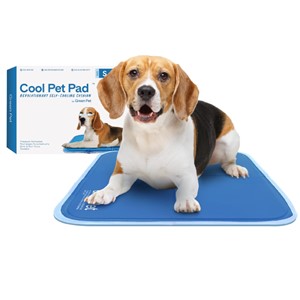
The Green Pet Shop Cooling Mat
Price At Time of Publish $40.00
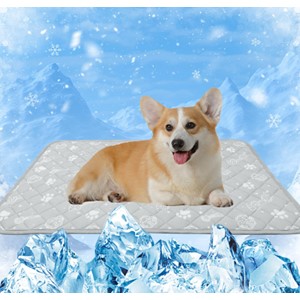
MH MYLUNE HOME Self Cooling Mat
Price At Time of Publish $40.00
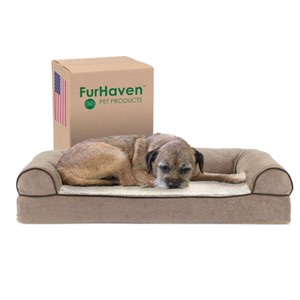
Furhaven Pet Products Cooling Gel Bolsters Small Bed
Price At Time of Publish $45.00
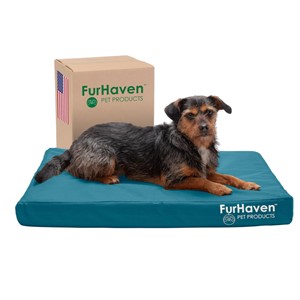
Furhaven Cooling Gel Medium Bed
Price At Time of Publish $42.00

ARF Pets Cooling Gel Pad
Price At Time of Publish $35.00
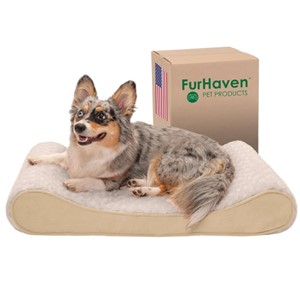
Furhaven Cooling Gel Small Bed
Price At Time of Publish $50.00
Price At Time of Publish $50.00
Orthopedic Dog Beds
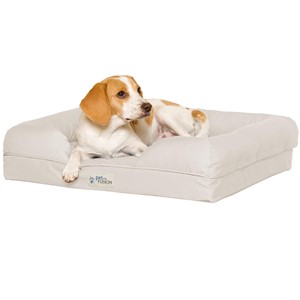
PetFusion Orthopedic Dod Bed
Price At Time of Publish $80.00
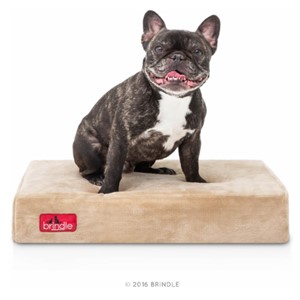
Brindle Orthopedic Bed Khaki
Price At Time of Publish $30.00
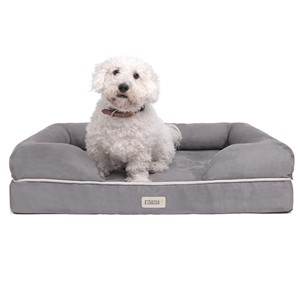
Friends Forever Orthopedic Bolster Bed
Price At Time of Publish $53.00
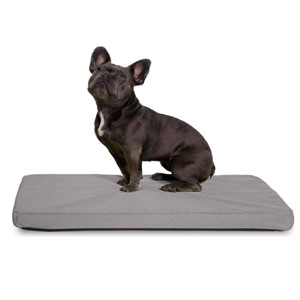
K9 Ballistics Tough Orthopedic Small Crate Bed
Price At Time of Publish $89.00
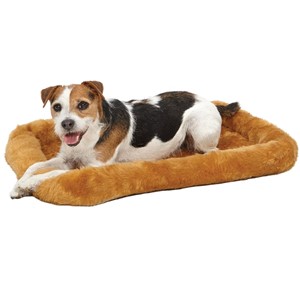
MidWest Homes Small Bolster Dog Bed
Price At Time of Publish $10.00
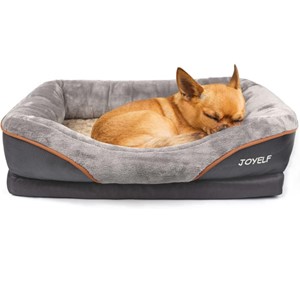
JOYELF Orthopedic Small Sofa Bed
Price At Time of Publish $40.00
Bolster Dog Beds
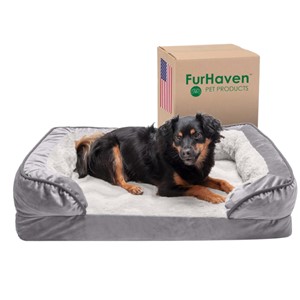
Furhaven Small-Medium Bolster Dog Bed
Price At Time of Publish $57.00
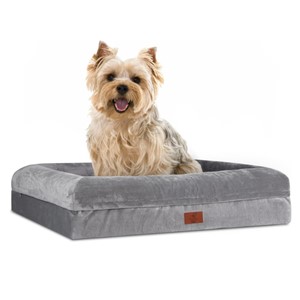
Yiruka Small Bolster Sofa Dog Bed
Price At Time of Publish $40.00
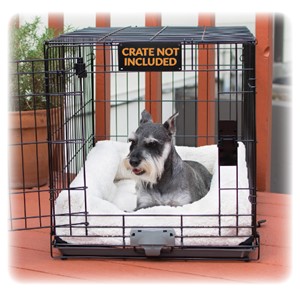
K&H Pet Products Bolster Crate Pad
Price At Time of Publish $22.00
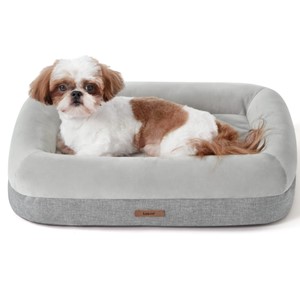
Leasure Small Bolster Dog Bed
Price At Time of Publish $40.00
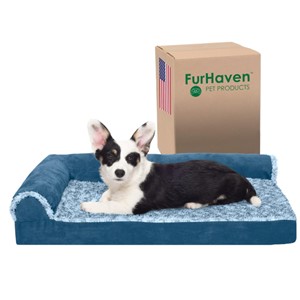
Furhaven Small-Medium L-Shaped Bed
Price At Time of Publish $39.00
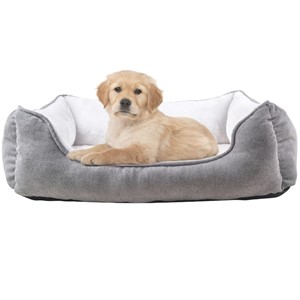
Long Rich Bolster Small Bed
Price At Time of Publish $27.00
Elevated Dog Beds
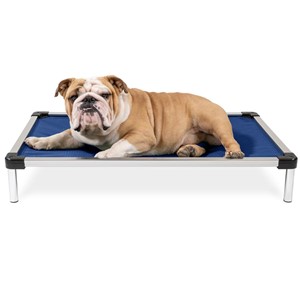
K9 Ballistics Chew Proof Elevated Small Bed
Price At Time of Publish $129.00
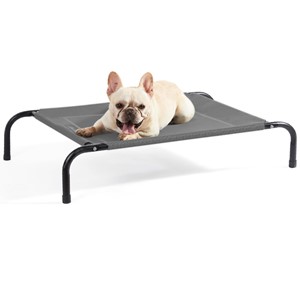
Bedsure Medium Elevated Dog Bed
Price At Time of Publish $33.00
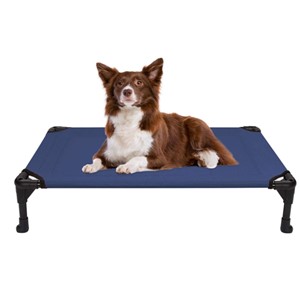
Veehoo Medium Elevated Dog Bed
Price At Time of Publish $45.00
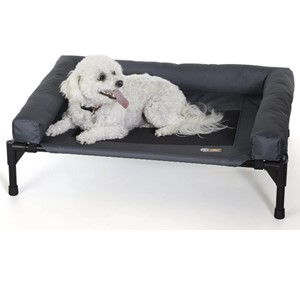
K&H Pet Products Elevated Bolster Dog Bed
Price At Time of Publish $57.00
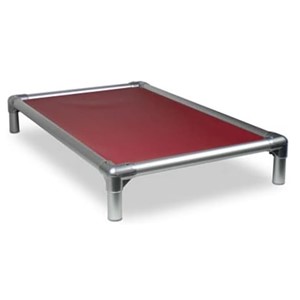
Kuranda Elevated Chew Proof Small Dog Bed
Price At Time of Publish $134.00
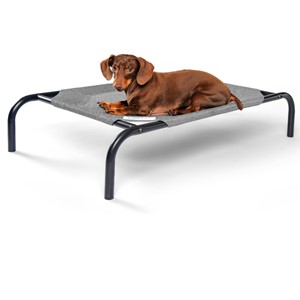
Coolaroo Small Elevated Dog Bed
Price At Time of Publish $21.00
Shop Cave/Donut Dog Beds
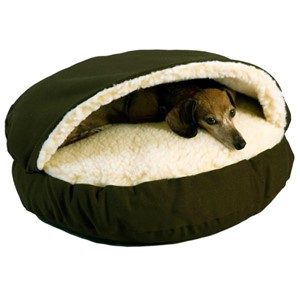
Snoozer Cozy Cave Bed
Price At Time of Publish $87.00
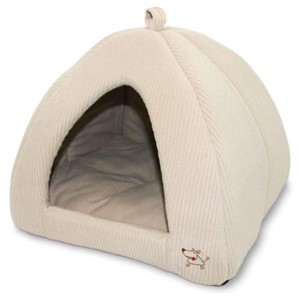
Best Pet Supplies Tent Bed
Price At Time of Publish $23.00
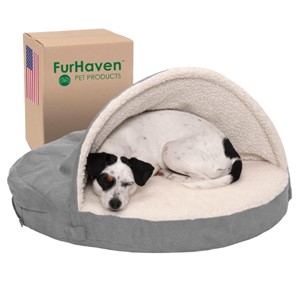
Furhaven Round Orthopedic Cave Bed
Price At Time of Publish $30.00
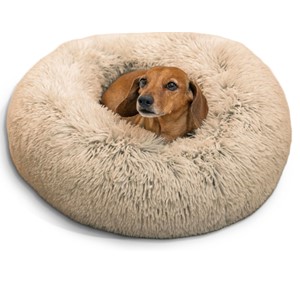
Best Friends by Sheri Original Calming Donut Bed
Price At Time of Publish $25.00
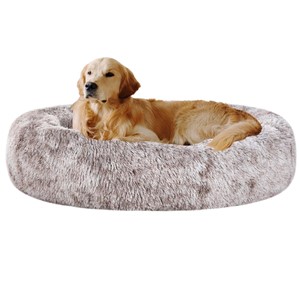
Coohom Oval Calming Donut Cuddler Bed
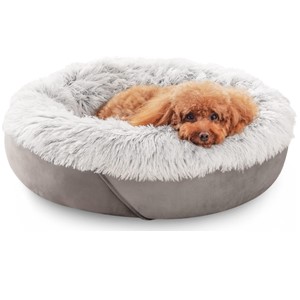
JOEJOY Calming Donut Small Dog Bed
Price At Time of Publish $33.00
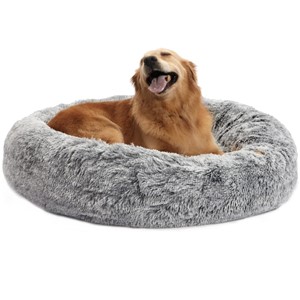
Bedfolks Calming Donut Dog Bed
Price At Time of Publish $66.00
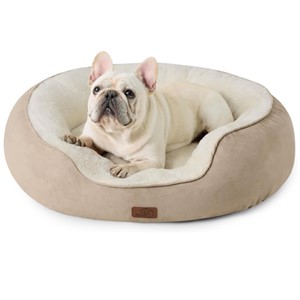
Bedsure Medium Donut Dog Bed
Price At Time of Publish $36.00

Bedsure Medium Donut Dog Bed
Price At Time of Publish $40.00
Related Articles
- Are Crates Bad for Dogs
- Best Healthy Dog Food Brands
- Christmas Presents for My Dog
- Dog Parasite Symptoms
- How To Clean Dog Beds
- Ingredients To Avoid In Dog Treats
- Puppy Proofing Your House
- Signs Your Dog Is Ill
- Using Alexa for Dog Behaviors
- When Should A Dog Bed Be Replaced
Go back to the Dog Luxury Beds home page.
